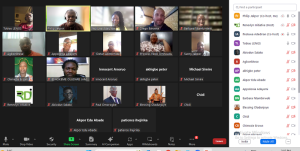Campaigners advocating for transparency in research have charged the Nigerian media to beam their spotlight on gene drives to checkmate the use of Africans as guinea pigs for western experiments.

They made this call at a virtual Journalism Training on Reporting Gene Drives organised by Nigerian non-governmental organisation, Renevlyn Development Initiative (RDI), for media practitioners in the print and electronic genre on Friday, March 22, 2024.
Barbara Ntambirweki of the AfriTAP/ETC Group while speaking on Africa’s concerns about gene drives said that there are unethical experiments going on in several countries in Africa without the knowledge of indigenous people where the experiments are being conducted.
Ntambirweki cited Uganda where gene drives mosquito was experimented in communities where the locals are paid to expose their legs to biting mosquitoes without the community people understanding what it was all about.
She explained that although regulations are yet to be put in place globally, the most advanced projects are aimed at malaria interventions, and that some African countries like Ghana, Burkina Faso, Tanzania and Uganda have already been targeted by research organisations with hidden motives.
According to her, the Target Malaria Research consortium wants to undertake open releases of gene drive mosquitoes that will, apparently, reduce the population of the female anopheles mosquito and the mosquito population and reduce malaria transmission and disease yet the initiative lacks transparency even in ongoing trials taking place.
She warned that Nigeria which has the highest malaria rate globally may be a potential target for the experiments except the media starts spotlighting the issue and getting policy makers to understand and take actions that will save the continent.
Managing Director of EnviroNews, Michael Simire, who delivered a presentation on “Communicating the Jargon of Science”, explained that science journalism covers subjects such as biotechnology, genetically modified organisms, global warming and climate change, among others, even as he went on to add that the identified spheres are where jargons such as DeoxyriboNucleic Acid or Polymerase Chain Reaction and Streptococcus which is essentially a bacteria and Apoptosis the jargon for cell death, among others.
He advised that, to write a good science news, the journalist must use simple language and avoid the jargon and technical terms to a large extent so as not to put the readers off. He stressed that jargon makes information difficult to understand and prone to misinterpretation. Giving an example, he said that rather than use the word “carcinogenic”, the journalist should use “cancer-causing”. He urged journalists to make use of real-life examples to write science news to help the audience understand what is being explained and make it relatable.
Speaking on “Gene Drives: What is it all about?”, Diego Barcena Menendez, an ecological farmer and former molecular scientist, introduced the participants to the world of CRISPR, a family of DNA sequences found in the genomes that are used to detect and destroy DNA from similar bacteriophages during subsequent infections.
Menendez explained that DNA is a set of instructions for all living organisms that are not linearly arranged but packed into Chromosomes. There are 23 in humans and six in mosquitoes. He revealed however that the process may lead to unintended consequences and that this possibility has continued to dog experiments on sterilising mosquitoes or inserting genes that can make them susceptible to insecticide which are being carried out in Africa.
Barbara Pilz, campaigner with Save Our Seeds, said that the political issues around gene drives are discussed mainly at the UN Convention on Biodiversity (CBD) and International Union for Conservation of Nature (IUCN), in addition to some national governments.
Pilz pointed out that signatories to the UN CBD meet every two years at the Conference of the Parties (COPs) meeting to discuss latest developments. In between the COPs, there are intersessional meetings to discuss specific topics and work on text. In some cases, an Ad Hoc Technical Expert Group might be put in place to support the process in certain subjects.
She related that text and recommendations are discussed, modified and approved during COPs and what is agreed becomes a new guideline or duty for the countries.
Earlier, RDI Executive Director, Philip Jakpor, said that in conceiving the training the organisation realised that the media is key not only in keeping the public informed but also in exposing and interrogating initiatives and innovations that are extraneous to Africans and African culture as part of its watchdog role.
Jakpor argued that RDI is not averse to technology or innovation as long as they are rooted in facts, the promotion of African culture, are indigenous and protect the people from manipulation in all forms. He went on to say that there is a new form of colonialism that targets altering food, food systems and nature as a whole.
He expressed worry that gene drives are being experimented already in Uganda, Ghana, and in Burkina Faso where in 2019 sterilised mosquitoes were released, even as he opined that Nigeria, with its huge population of more than 230 million people, may be a potential testing ground for gene drives.
